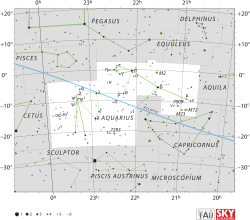Sigma Aquarii

| |
| Observation data Epoch J2000 Equinox J2000 | |
|---|---|
| Constellation | Aquarius |
| Right ascension | 22h 30m 38.81546s[1] |
| Declination | –10° 40′ 40.6238″[1] |
| Apparent magnitude (V) | 4.81[2] |
| Characteristics | |
| Spectral type | A0 IVs[3] |
| U−B color index | –0.14[2] |
| B−V color index | –0.08[2] |
| Astrometry | |
| Radial velocity (Rv) | +11[4] km/s |
| Proper motion (μ) | RA: +0.30[1] mas/yr Dec.: –26.87[1] mas/yr |
| Parallax (π) | 11.26 ± 1.26[1] mas |
| Distance | approx. 290 ly (approx. 89 pc) |
| Details | |
| Surface gravity (log g) | 3.75[5] cgs |
| Temperature | 10,125[5] K |
| Rotational velocity (v sin i) | 22[5] km/s |
| Other designations | |
| Data sources: | |
| Hipparcos Catalogue, CCDM (2002), Bright Star Catalogue (5th rev. ed.) | |
Sigma Aquarii (σ Aqr, σ Aquarii) is the Bayer designation for a double star in the equatorial constellation of Aquarius. It is visible to the naked eye with an apparent visual magnitude of 4.81.[2] Based upon parallax measurements, the distance to this star is roughly 290 light-years (89 parsecs).[1]
Sigma Aquarii is an astrometric binary with an orbital period of 654 days. The primary component has a stellar classification of A0 IVs,[3] indicating that it is a subgiant star. This is categorized as an Am star, meaning that it is a chemically peculiar. The spectrum displays at least double the normal abundances of elements like magnesium, aluminum and silicon, while helium and scandium are under-abundant.
In Japanese, 貴子星 (Takako-boshi), meaning "Precious Girl Star," refers to the Japanese description of σ Aquarii.
References
- ↑ 1.0 1.1 1.2 1.3 1.4 1.5 van Leeuwen, F. (November 2007), "Validation of the new Hipparcos reduction", Astronomy and Astrophysics 474 (2): 653–664, arXiv:0708.1752, Bibcode:2007A&A...474..653V, doi:10.1051/0004-6361:20078357.
- ↑ 2.0 2.1 2.2 2.3 Johnson, H. L. et al. (1966), "UBVRIJKL photometry of the bright stars", Communications of the Lunar and Planetary Laboratory 4 (99), Bibcode:1966CoLPL...4...99J.
- ↑ 3.0 3.1 Cowley, A. et al. (April 1969), "A study of the bright A stars. I. A catalogue of spectral classifications", Astronomical Journal 74: 375–406, Bibcode:1969AJ.....74..375C, doi:10.1086/110819.
- ↑ Wilson, R. E. (1953), General Catalogue of Stellar Radial Velocities, Carnegie Institute of Washington D.C., Bibcode:1953GCRV..C......0W.
- ↑ 5.0 5.1 5.2 Adelman, S. J.; Young, J. M.; Baldwin, H. E. (February 1984), "Optical region elemental abundance analyses of B and A stars. II - The hot AM stars Omicron Pegasi and Sigma Aquarii and the marginal peculiar A star Nu CANCRI", Monthly Notices of the Royal Astronomical Society 206: 649–660, Bibcode:1984MNRAS.206..649A, doi:10.1093/mnras/206.3.649.
- ↑ "sig Aqr -- Star", SIMBAD Astronomical Object Database (Centre de Données astronomiques de Strasbourg), retrieved 2012-07-04.
External links
| ||||||||||||||||||||||||||||||||||||||||||||||||||||||||||||||